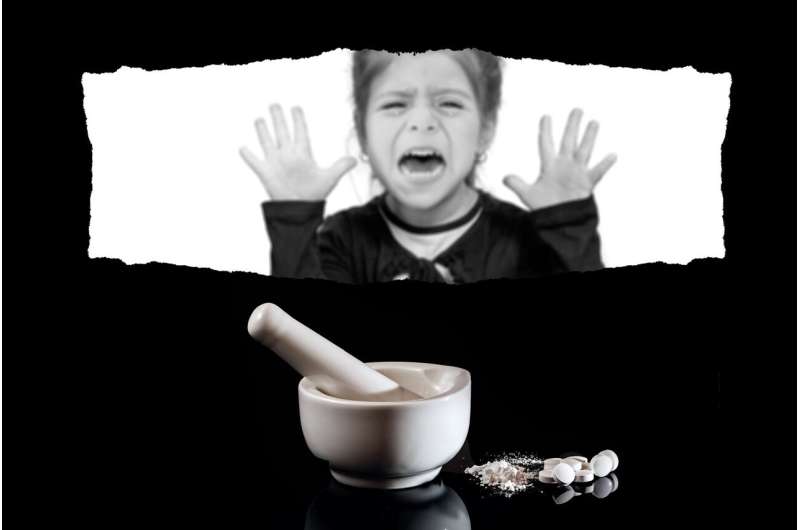This article has been reviewed according to Science X's editorial process and policies. Editors have highlighted the following attributes while ensuring the content's credibility:
fact-checked
trusted source
reputable news agency
proofread
Ask the Pediatrician: How to prevent children from poisoning in the home?

Every year, about 50,000 U.S. children visit the emergency room because they swallowed something potentially dangerous. The good news is that most of those children go home without having suffered any serious harm. The scary news is that about 9,000 children need to be hospitalized, and some die from poisoning.
Today, opioids are the most common substance contributing to fatal poisonings among children age 5 and under. The proportion of opioid-related poisonings are on the rise, contributing to 52.2% of deaths in 2018 compared to 24.1% of poisoning-related deaths in 2005, a new study shows.
Children are curious—and they love putting things in their mouths. Exploring what objects feel and taste like is part of how they learn about the world around them. There are some steps that caregivers can take whether at home or visiting others to help prevent a tragedy.
Here are some tips to keep medications out of the hands of children.
- Store all medications in a cupboard or high shelf, well out of a child's sight. In about half of over-the-counter medication poisonings, the child climbed onto a chair, toy or other object to reach the medication.
- Keep medicines in their original containers, with child-safety caps.
- If there are controlled substances (like prescription pain medications or ADHD medicine) consider using a locked box for extra safety.
- Keep track of how many pills are in the bottle and write the start date on the label. This way, if a spill occurs, you'll know if any are missing.
- When giving your child medicine, lean over a counter or table. This helps contain any accidental spills.
- Any medication can be dangerous, so treat all products with the same respect. We worry about opioids, but some blood pressure and diabetes medications can be fatal to a toddler who swallows only one pill.
- If a medication spills, vacuum or sweep the area as an extra precaution to ensure nothing is missed.
- Dispose of unused medications—especially opioids—at pharmacies, drug "take back" programs or doctors' offices
- Know basic first aid and keep the Poison Center Number (800-222-1222) stored in your phone.
- Get into the practice of safe medication storage, starting as soon as your baby is born.
Sometimes children are prescribed pain-killers for an injury or medical concern. While many people believe opioids work best for pain, recent studies show that non-opioid medicines such as ibuprofen and naproxen, as well as non-medical approaches, can be just as effective.
If children continue to have severe pain, a doctor may prescribe a pain reliever that contains an opioid. If your child is prescribed an opioid, it is important to monitor your child's use of it. It should be taken exactly as prescribed, and for the shortest time necessary. Also consider talking with the doctor about co-prescribing naloxone, which can prevent opioid overdose deaths, whenever an opioid is prescribed.
Children who learn about medication safety at home are less likely to use drugs than those who don't learn this at home. Start talking about medication safety early by advising young children not to take any pills without asking you first.


















